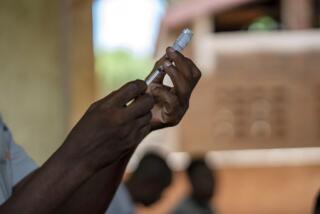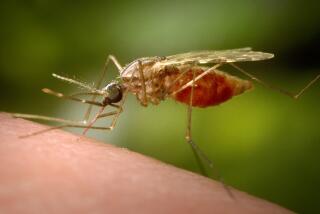New Drug Said to Slow AIDS Growth
- Share via
WASHINGTON — Researchers at the pharmaceutical maker Merck & Co. announced Sunday that one of their experimental AIDS vaccines is able to protect monkeys from progressing to the damaging stage of the disease even though it does not protect the animals from infection with the AIDS virus.
Three animals given the vaccine are healthy and immunologically normal more than eight months after being infected with an unusually virulent strain of the AIDS virus. Over the same period, four of six unvaccinated monkeys died.
The promising vaccine, one of several described at a meeting of AIDS vaccine researchers this weekend in Colorado, is fashioned from a cold virus into which a gene from the AIDS virus has been stitched. The findings show there might be a use for AIDS vaccines whose main action is to prime the immune system rather than prevent infection outright.
“We have no idea how this will translate to people,” said John W. Shiver, director of vaccine research at Merck. “But it certainly gives the suggestion that a vaccine based [on this strategy] could have potential.”
Shiver and his colleagues fashioned their vaccine to stimulate only cell-mediated immunity, one of two arms of the immune system.
With cell-mediated immunity, the body produces cells, known as T-lymphocytes, that home in on and kill cells that have been infected by a virus.






